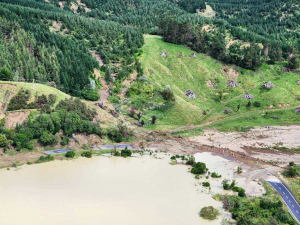Pay Equity Crucial for Rural Communities - RWNZ
Rural Women New Zealand (RWNZ) says it welcomes the release of a new report into pay equity.
 Cyclone Gabrielle left many areas cut off and farms and orchards severely damaged. Photo Credit: New Zealand Defence Force.
Cyclone Gabrielle left many areas cut off and farms and orchards severely damaged. Photo Credit: New Zealand Defence Force.
Two months on from Cyclone Gabrielle, Rural Women New Zealand (RWNZ) says it is experiencing high demand from those seeking to access the organisation’s Adverse Events Fund.
RWNZ national president Gill Naylor says the demand for funds was anticipated and it was expected that the response would be ongoing.
“We are grateful for the support shown by our members, groups like the Soil Sisters who have fundraised for us and the generosity of a private benefactor,” Naylor she says.
All up, the donations have resulted in $70,000 in funds being collected so far this year.
“This combined with existing funds means we have been well placed to assist,” she says.
As of this week, over $50,000 in grants have been made to individuals, families and groups in the affected areas.
The majority of grant have been for $1,000 and paid out in the last month.
Over 20 further applications are under consideration and additional requests for support are being received almost daily.
“We value our relationships with agencies such as Rural Support Trust and Catchment Group co-ordinators who are able to alert and refer those in need to this funding,” says Naylor.
“We receive feedback from grant recipients regularly. It is notable, and humbling, that their appreciation is not only for the financial assistance but also the boost of knowing that someone cares about their situation and is willing to help,” she says.
“We know that demand will be ongoing for some time, and we encourage those who are in a position to do so to donate to the Fund knowing that it provides immediate, necessary assistance to individuals and families for costs not covered by insurance or other support.”
If you’d like to donate to the fund, head to https://ruralwomennz.nz/
Castle Ridge Station has been named the Regional Supreme Winner at the Canterbury Ballance Farm Environment Awards.
The South Island Dairy Event has announced Jessica Findlay as the recipient of the BrightSIDE Scholarship Programme, recognising her commitment to furthering her education and future career in the New Zealand dairy industry.
New Zealand and Chile have signed a new arrangement designed to boost agricultural cooperation and drive sector success.
New DairyNZ research will help farmers mitigate the impacts of heat stress on herds in high-risk regions of the country.
Budou are being picked now in Bridge Pā, the most intense and exciting time of the year for the Greencollar team – and the harvest of the finest eating grapes is weeks earlier than expected.
The Real Estate Institute of New Zealand (REINZ) has released its latest rural property report, providing a detailed view of New Zealand’s rural real estate market for the 12 months ending December 2025.

OPINION: A mate of yours truly reckons rural Manawatu families are the latest to suffer under what he calls the…
OPINION: If old Winston Peters thinks building trade relations with new nations, such as India, isn't a necessary investment in…